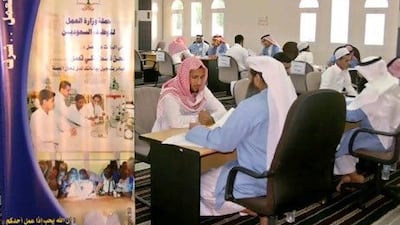Saudi Arabia has emerged as an economic star with major financial institutions, but appearances can be deceiving.
Saudi policymakers have been quick to measure the economy's progress against international indexes, such as the World Bank's annual Doing Business report, that gauge economic regulations.
On the basis of indicators such as the time taken to start a business and levels of investor protection, the country has made great gains up the bank's globally recognised benchmark.
The nation is 11th in this year's ranking, higher than any other GCC state and up one place from last year.
Some in the kingdom say the figures mask a more challenging reality.
"Sometimes the international indicators are not really sensing actual life," says Ghazi Binzagr, a board member of the Binzagr Group of Companies.
Mr Binzagr, whose company is one of the largest products distributors in the kingdom, believes there is a need for deeper reform. He is not alone in his views.
"More deregulation is needed," says Abdullah Murad, a commercial lawyer based in Jeddah. "There are too many rules and processes in place. For people to come and invest Saudi Arabia regulations need to be opened."
Mr Murad estimates it takes as long as two months to gain a licence to open a business. In contrast, the Doing Business assessment says only five days are required to register a company in Saudi Arabia.
Red tape is putting at risk a growing surge in interest from prospective foreign investors from the Far East, especially China, Singapore and Malaysia, Mr Murad says.
Such overseas investment has been identified as vital by the government as it looks to the private sector to help to find jobs.
Unemployment runs at 10 per cent, rising to 39 per cent among those aged between 20 and 24. Anger at a shortage of jobs was one catalyst of the recent uprisings in other parts of the Middle East.
"The ideal way to treat the disease of unemployment would be procedures agreed with the private sector," said Prince Khalid al Faisal bin Abdul Aziz Al Saud, the governor of Makkahprovince in western Saudi Arabia, during the Jeddah Economic Forum last week.
"There is a very strong will in the private sector to help solve this problem."
In a bid to help the unemployed and to ease a pressing income gap between rich and poor, King Abdullah on March 18 announced expenditure increases, estimated to total 350 billion riyals (Dh342.8bn).
The king's action followed a US$36bn (Dh132.23bn) handout package ordered last month. The measures were heralded by policymakers as a huge boost to economic development.
But to ensure real economic progress, officials may need to make fundamental changes in policy direction, say economists.
Since the 1990s, Saudi Arabia has channelled its oil wealth into rapidly developing its economy. Although such efforts have contributed to impressive growth rates, they have also had unwelcome side-effects - rampant inflation, for one, but also a growing gap between society's haves and have-nots.
Beggars tapping on car windows at traffic lights in Jeddah, the kingdom's second city, are proof that not all have shared in the recent prosperity push.
"The focus has been on economic efficiency and that balance will have to change," says Dr Jarmo Kotilaine, the chief economist for NCB in Saudi Arabia. "Increasingly, what you need to think about is: 'Is everybody benefiting and getting a reasonable slice of the pie?'"
From Bahrain to Yemen, brewing tensions on the kingdom's borders helped to force King Abdullah's hand.
Analysts agree the measures will play a positive role in spurring the economy.
Jadwa Investment last week raised its GDP forecast to 5.6 per cent this year, the highest since 2005. Spending in the two royal decrees would bolster non-oil private sector expansion, offsetting a weaker regional economy and waning foreign investment appetite, it said.
But questions remain about the package offered.
"Some parts of society may find it disappointing that there's no greater movement towards greater structural reform and greater inclusiveness within the economic plan," says Professor Nouriel Roubini, the New York University economist.
Questions also arise about the sustainability of unemployment benefits of 2,000 riyals for each job seeker. Youth unemployment is already considerable but the future challenge appears even more immense. The kingdom's working age population will rise by 73 per cent by 2050, the highest of the 30 biggest global economies, according to HSBC research.
A big part of the two measures will be funnelled into education as officials recognise the need to better link up young Saudis with the labour market. But that still does not benefit everyone, say economists.
"They have been taking important steps," says Dr Kotilaine. "But if you are a poor unemployed middle-aged person in Saudi, how does it help you?
"All it does is improve the opportunities your children may face 10 or 20 years down the line but does nothing to address your economic concerns."

